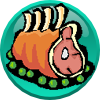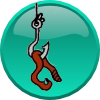Who Could It Be?
READING
Psalm 22
Exodus 12
Zechariah 12
Isaiah 53
Mark 14
John 19
The chief priest inquired of him and said to him, “You’re the Anointed? The son of the blessed one?”
And Yeshua said to him, “I am.”
Read through each chapter.
Ask God to show you what you need to see.
Discuss anything that seems interesting and see where it takes you.
As you read each new chapter, look for common themes, and also discuss how it relates to the others.
And finally ask yourself, “So what?”
Was this just some interesting information? Or is it life changing?
What are you going to do differently from now on?
What choices are you going to need to change?
How is this study going to influence your lifestyle?
Normally these 6 Chapter studies are more free form and let you just answer a list of questions.
This one has more of what I thought some of the answers were along the way on my own journey, but I think the process of reading those 6 chapters at one time, and talking about them with other people is such a useful thing to do, I would ask you to do that as well some time after you read this article.
There are several interesting Old Testament chapters which talk prophesy that a special person will come and do particular things. The person is called “The Messiah” (The Anointed One), and he’s supposed to come twice. Once as a servant who is despised and rejected, and dies for the sins of the world. And once as a king, who sets up his kingdom in Jerusalem and people come from all around the globe to worship him.
Who could it be?
How many people do you know of who could fit this?
So, firstly, 2,000 years ago the Jewish collection of Psalms didn’t have numbers.
If you wanted to refer to one you would quote the start.
So if someone suggested, singing “The LORD is my Shepherd, I shall not want”, they would be talking about the one we call Psalm 23.
So when Yeshua was being impaled, and he called out, “My god, my god, why have you forsaken me?” Was he referring to what we call Psalm 22?
My God, my God, why have you forsaken me?
I am a worm, and no man; a reproach of men, and despised by the people.
All those who see me mock me. They insult me with their lips. They shake their heads, saying, “He trusts in Yahweh; let him deliver him. Let him rescue him, since he delights in him.”
I am poured out like water. All my bones are out of joint. My heart is like wax; it is melted within me.
My strength is dried up like a potsherd. My tongue sticks to the roof of my mouth. You have brought me into the dust of death.
dogs have surrounded me. A company of evildoers have enclosed me. They have pierced my hands and feet.
I can count all of my bones. They look and stare at me. They divide my garments among them. They cast lots for my clothing.
That Psalm is grouped in “The Psalms of David”, and he was king about a thousand years before Yeshua was born to Mary. So about three thousand years ago, someone, presumably David himself, wrote that as some kind of special, spiritual song.
Who did he have in mind? Himself? It doesn’t fit the way he died at all. Or how he was treated.
But it does fit how Yeshua died. His hands and feet pierced, nailed to a stake. They even liked his garment so much they cast lots for it rather than rip it into pieces and take one piece each.
I remember when an old man, Mr Woodward, first showed me this just before I turned 25. I was blown away. 1,000 years before it happened, how could it be so accurate unless there is something actually going on with this Christianity thing?!
Then he showed me back at the Exodus. 1500 years before Yeshua. They were commanded to gather on a special day of the year and eat a roast lamb. They weren’t allowed to break its bones. And it symbolised them being saved from slavery in Egypt. And they had to do this on the same day every year so they never forgot how God had saved them.
And then, about 1500 years later Yeshua was nailed to a stake, on that same day of the year, to save not just the Jews, but all of us from slavery to sin and its eternal consequence. And because it was a holiday the Romans wanted to speed things up so they broke the legs of the people who had been hung up that day. But when they came to Yeshua he was already dead, and none of his bones were broken.
I honestly went home from that meeting with Mr Woodward a changed person. This was what I had been looking for. A religion which wasn’t just invented recently, or even 2,000 years ago, but which had been declared since day 1 of creation, and which had unequivocally unfolded over the centuries, without any way for the prophet to have known the person who fulfilled it.
I knew if any “religion” was really true, it would pass this test. It did.
Several hundred years after David wrote the Psalm, Zechariah wrote something about the coming of the future Messiah too. In chapter 12 of Zechariah there is an interesting prophecy. More on that in a sec, but towards the end it says, “they will look to me whom they have pierced; and they shall mourn for him, as one mourns for his only son, and will grieve bitterly for him, as one grieves for his firstborn.” Who was this who was pierced by the Jews of Jerusalem? They will look on him. They will see him. He will be in Jerusalem!
The one they know they pierced, will come back. To save them!
Interestingly this chapter is talking about a time when Jerusalem is hated and surrounded and attacked by all the nations of the world. But Yahweh himself will defend them, to the point that even their feeble ones will be as mighty as David was as a warrior. And the strong, will be like God!
Seeing the events of 2024 unfolding in Jerusalem, and the reactions around the world of people and governments defending the Palestinians and their terrorist actions, I can easily imagine that this day talked about in Zechariah over 2500 years ago, … could be about to happen!
So, just like Keith Green in “No Compromise”, let’s finish up with a look at Isaiah 53.
(Which for some reason I heard that modern Jews won’t read. It’s in their scriptures. But they won’t read it.)
Who is this Isaiah is writing about?
“He was oppressed, yet when he was afflicted he didn’t open his mouth.
As a lamb that is led to the slaughter, and as a sheep that before its shearers is silent, so he didn’t open his mouth.”
And almost 700 years later, Mark wrote this:
And when he’d risen up into the middle, the chief priest inquired of Yeshua saying, “You aren’t answering anything? What are these who testify against you?” But he was silent and didn’t answer anything.
Again the chief priest inquired of him and said to him, “You’re the Anointed? The son of the blessed one?”
And Yeshua said to him, “I am. And you’ll see the Son of Man sitting at the right hand of power, and coming with the clouds of the sky.”
The Chief Priest knew those Old Testament references. I wonder how many times he regretted what he said next.
“They made his grave with the wicked, and with a rich man in his death; although he had done no violence, nor was any deceit in his mouth.”
And why did he endure this?
Isaiah said:
“He was pierced for our transgressions. He was crushed for our iniquities.
The punishment that brought our peace was on him; and by his wounds we are healed.
All we like sheep have gone astray. Everyone has turned to his own way; and Yahweh has laid on him the iniquity of us all.”
So, read those 6 chapters, and make your own conclusions.
Read John 19 last and discuss with other people how all those things could be there together in a chapter about one day in history, and how they could have been prophesied about one person over the 1500 years before that.
And then decide for yourself. Is Yeshua the Messiah, the Anointed?












